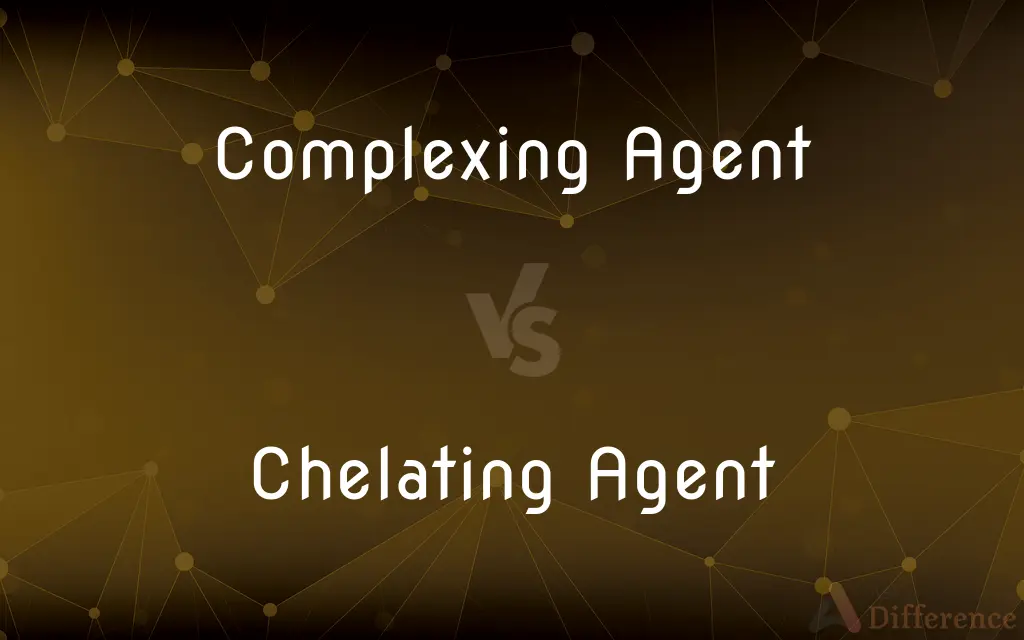Complexing Agent vs. Chelating Agent — What's the Difference?
By Tayyaba Rehman — Published on October 16, 2023
A Complexing Agent forms complexes with ions. A Chelating Agent, a subset of complexing agents, uses multiple points of attachment to trap ions. Both interact with metal ions, but chelating specifically encapsulates them.

Difference Between Complexing Agent and Chelating Agent
Table of Contents
ADVERTISEMENT
Key Differences
Complexing Agents: These are substances that can form coordinate bonds with an ion. The nature of this bond allows the Complexing Agent to surround and interact with the said ion. On the other hand, the Chelating Agent, while also forming coordinate bonds, does so in a specific manner.
Chelating Agents: These are a specific type of Complexing Agent, characterized by their ability to form multiple bonds with a single metal ion. This "multi-toothed" grip on the metal ion gives Chelating Agents their distinct property, differentiating them from generic Complexing Agents.
Applications: Both Complexing Agents and Chelating Agents find utility in various sectors like medicine, industry, and agriculture. Complexing Agents might be used to stabilize a solution or process, while Chelating Agents can remove unwanted metal ions or prevent their adverse activity.
Molecular Structure: The structural distinction between Complexing and Chelating Agents lies in the bond formation. A Complexing Agent might bind at a single point to an ion, whereas a Chelating Agent forms rings by attaching at multiple points to the same ion.
Effectiveness: While both can interact with metal ions, Chelating Agents often exhibit a stronger and more stable interaction due to their multiple binding sites, as opposed to other Complexing Agents.
ADVERTISEMENT
Comparison Chart
Bond Formation
Can be single-point attachment
Multi-point attachment to a single ion
Molecular Structure
Might not form rings with ions
Forms rings with ions
Specificity
General term for agents forming complexes
Specific type of complexing agent
Applications
Stabilization, interaction with ions
Removal or inhibition of metal ions, stabilization
Stability of Complexes
Can vary
Often more stable due to multiple attachments
Compare with Definitions
Complexing Agent
An entity that can surround and interact with certain ions.
By introducing a Complexing Agent, they managed to reduce the reactivity of the mixture.
Chelating Agent
Exhibits a "multi-toothed" interaction with ions.
The Chelating Agent gripped the metal ion at three different points, ensuring its stability.
Complexing Agent
Can be organic or inorganic in nature.
This organic Complexing Agent was selected for its specific interaction with calcium ions.
Chelating Agent
Used to sequester or stabilize metal ions.
In water treatment, a Chelating Agent can help prevent metal-induced hardening.
Complexing Agent
Used to stabilize a solution by forming complexes.
The presence of the Complexing Agent ensured the metal ions remained passive.
Chelating Agent
Often organic molecules with multiple donating groups.
This Chelating Agent, with its multiple donating sites, effectively outcompeted other molecules for the metal ion.
Complexing Agent
Can form a diverse range of complexes with ions.
The versatility of the Complexing Agent allowed it to interact with multiple ions in the assay.
Chelating Agent
Forms multiple bonds with a single metal ion.
The Chelating Agent was effective in removing the excess copper from the sample.
Complexing Agent
A substance that forms coordinate bonds with ions.
In the lab, a Complexing Agent was added to stabilize the solution.
Chelating Agent
Characterized by its ability to form ring structures with metal ions.
Thanks to the Chelating Agent, the metal ion was effectively encapsulated within a molecular ring.
Common Curiosities
Are Chelating Agents always more effective than Complexing Agents?
Not always, but they often form more stable complexes due to their multiple binding sites.
How do I choose between a Chelating and a Complexing Agent?
It depends on the application and desired outcome; a detailed understanding of each agent's properties helps in selection.
Can Complexing Agents be used in medicine?
Yes, they can be used in scenarios like drug formulation or detoxification.
Why are these agents important in industrial processes?
They can stabilize reactions, remove unwanted ions, or facilitate certain chemical processes.
Are these agents naturally occurring or synthesized?
Both. Some can be found in nature, while others are synthetically produced for specific applications.
How are the effectiveness and strength of these agents measured?
It's typically gauged by their stability constants or their ability to sequester certain ions.
Is every Chelating Agent a Complexing Agent?
Yes, all Chelating Agents are Complexing Agents, but not vice versa.
Do both agents form the same kind of bonds?
Both form coordinate bonds with ions, but Chelating Agents do so at multiple points.
Why are Chelating Agents used in water treatment?
They help in removing or stabilizing unwanted metal ions, preventing issues like water hardness.
Are there safety concerns with using these agents?
It depends on the specific agent and its concentration. It's always essential to follow safety guidelines.
Do these agents interact with all metals?
Not necessarily. Their efficiency and interaction can vary depending on the metal and the agent.
Can I use a Chelating Agent for home applications?
Some Chelating Agents are found in consumer products, but always ensure they're safe for the intended use.
Is EDTA a Chelating Agent?
Yes, EDTA is a well-known Chelating Agent.
Is it possible to have a Complexing Agent that isn't organic?
Yes, Complexing Agents can be both organic and inorganic.
Can these agents be used in food processing?
Yes, some are used to stabilize or enhance the quality of certain food products.
Share Your Discovery

Previous Comparison
Replication vs. Transcription
Next Comparison
Cruelty vs. SadismAuthor Spotlight
Written by
Tayyaba RehmanTayyaba Rehman is a distinguished writer, currently serving as a primary contributor to askdifference.com. As a researcher in semantics and etymology, Tayyaba's passion for the complexity of languages and their distinctions has found a perfect home on the platform. Tayyaba delves into the intricacies of language, distinguishing between commonly confused words and phrases, thereby providing clarity for readers worldwide.
















































